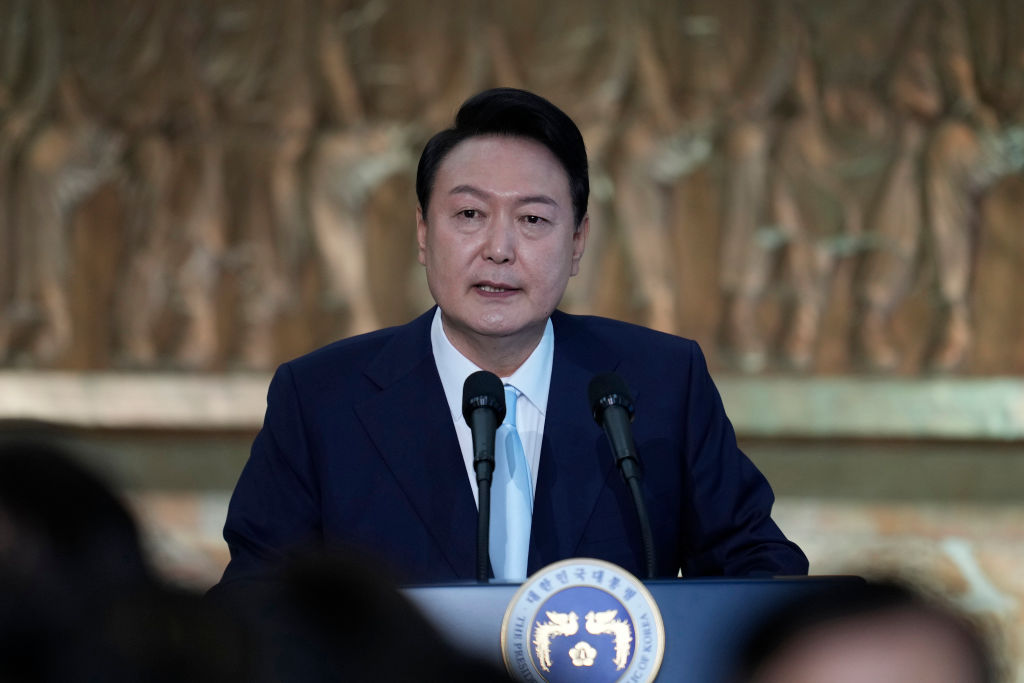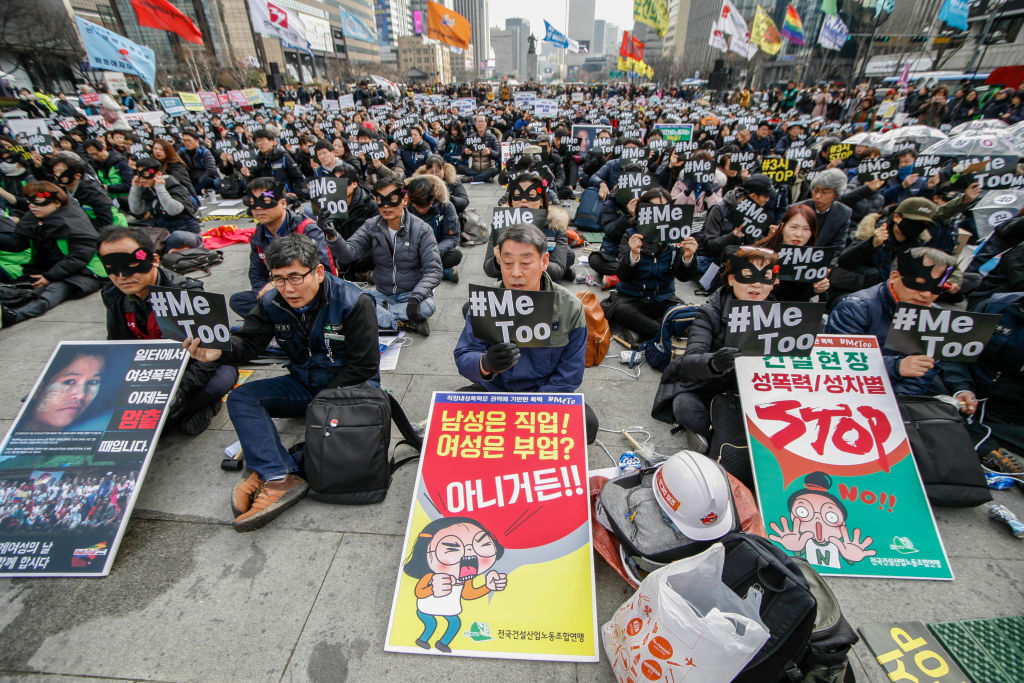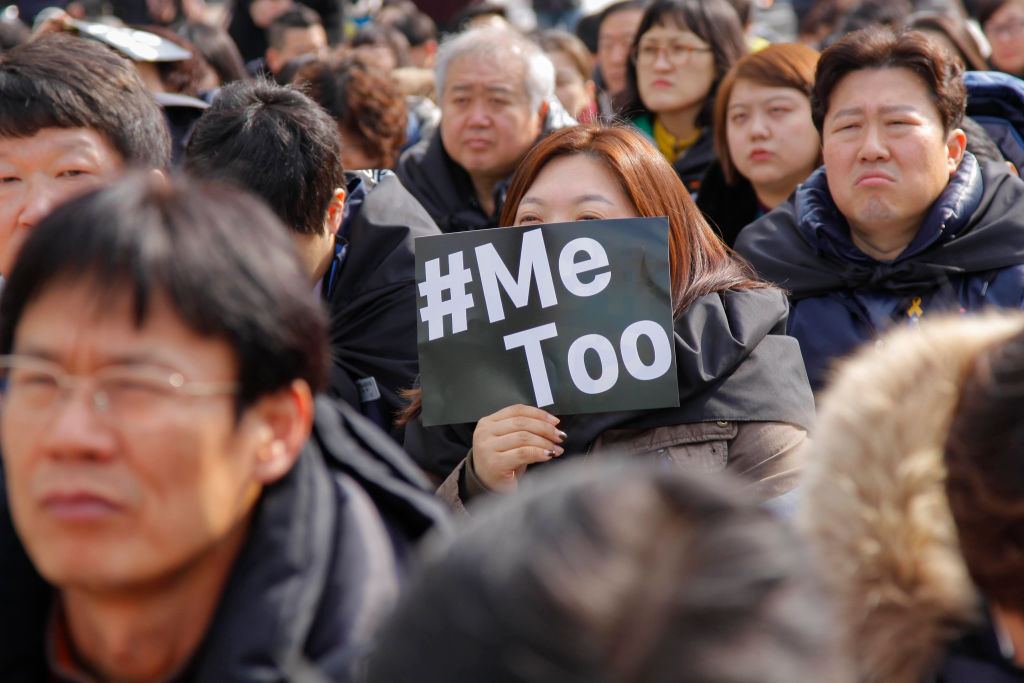The 33-year-old woman had attempted suicide twice: the years-long investigations and trials had been that stressful. Even then, she said she had only reported a fraction of the sexual abuse she’d suffered, fearing she might be punished for false accusations if her allegations were dismissed under South Korea’s strict rape law.
“This is the painful reality faced by victims on the ground. Yet these politicians only keep talking about so-called false sex crime accusers as a winning strategy for elections,” said the woman, who requested not to be named for fear of public shaming.
The politicians she refers to are now in charge. President Yoon Suk-yeol came to power in May last year on a platform that included anti-feminist ideas, accusing them of causing the country’s low birth rate and denying structural sexism existed in the country, despite social and economic indicators that strongly suggest otherwise. One of his chief campaign promises was that he would go after people who lie about being raped.
Since Yoon took office, the number of people investigated in cases of “false accusations” has surged. While most of these cases don’t involve sexual assault, South Korean women’s rights activists say politicians and much of the media have focused on false allegations of rape, fomenting a hostile environment that silences genuine rape survivors.

Not long ago, a feminist wave was sweeping across the economically advanced but culturally conservative country, launching Asia’s most powerful #MeToo movement and taking down powerful abusers, including a presidential contender. But these women are now facing a major political backlash. A men’s rights movement that rejects the notion of male privilege has rallied around the belief that false accusations of rape and sexual assault are widespread, and it helped fuel Yoon’s rise to the presidency. Though official statistics on the number of sexual assault cases reported in 2022 have not yet been released, The Fuller Project and Foreign Policy spoke to several women’s rights advocates who say they’ve already noticed a “chilling effect” on rape survivors thinking about filing a case.
“When victims call us for help these days, one of the most common questions they ask is, ‘Would I be charged with false accusation if I report my case?’” said Yun Gyeong-jin, an official at the nonprofit Korea Sexual Violence Relief Center (KSVRC). “Now, many victims seem to think not once, but twice, three times before making a decision on whether to report or not. It’s a worrying situation.”
Earlier this year, South Korean prosecutors announced that the number of indictments in “false accusations” was 68.8 percent higher in the second half of 2022 compared to the previous six months, before Yoon began his term. A flurry of sensational headlines greeted the announcement. “Those who falsely claim ‘I’ve been raped’ will become convicts if caught by this prosecutor,” one proclaimed.
Prosecutors say the increase is the result of a course correction after the previous center-left administration restricted their powers. But feminists say the focus on rape is telling.
“Although the prosecutors’ latest crackdown targeted … false accusations of all kinds, only false sexual assault complaints were promoted and recognized as the most typical case of false accusation. It’s because we live in a world where catching false complaints of sexual assault is considered a key accomplishment,” said a joint statement by about 50 women’s rights groups.
Coercion vs. consent
At the heart of the controversy is a 1953 law that defines rape on the basis of physical violence, not lack of consent. The switch from coercion-based to consent-based rape law has been adopted in recent decades by several countries, mostly in Europe, reflecting United Nations guidelines that favor the latter. Feminists in South Korea have been trying to reform the law for years, but their efforts have created a sense of panic among some men who believe it would result in a flood of false allegations of rape.
“This is a law aimed at killing men,” wrote one commentator on FMKorea, a prominent right-wing website popular among young men.
South Korea has become a global economic powerhouse, but it continues to suffer some of the widest gender inequities among wealthy countries. It has the largest gender pay gap—by a significant margin—among OECD countries, and women only account for 15 percent of managerial positions in government and the private sector. The country is considered exceptionally safe, except that nearly 90 percent of violent crimes are committed against women.
The global #MeToo movement inspired many South Korean feminists to hit the streets and voice their grievances like never before, and they successfully campaigned to legalize abortion and pushed through landmark legal changes on the widespread problem of tech-based sexual abuse, most notably spycam porn crimes. But this has also motivated a men’s rights counter-movement to fight back with vigor. When Yoon, a former chief prosecutor and presidential candidate, began to roll out campaign promises that echoed their rallying cries, they lined up behind him.

During his campaign, Yoon promised to dismantle the country’s gender equality ministry, which is highly controversial with the men’s rights movement. When the ministry, after years of deliberation and pressure from feminist groups, suggested updating the rape law to base it on consent, the proposal drew such swift, angry condemnations from the ruling party’s lawmakers that they withdrew the idea in just nine hours. Now, the Yoon administration is considering removing reformation of the law from its gender equality ministry’s five-year plan to ensure it won’t be officially discussed during his term in office, which ends in 2027.
“The changes in the political and social climates are clearly having a chilling effect,” one prominent advocate for sexual assault victims told The Fuller Project and Foreign Policy. The advocate goes by the nicknames “Witch” or “D” in order to protect herself from the harassment that frequently targets women who speak out about rape in South Korea.
Witch knows this harassment from personal experience. A survivor herself, she had to fight off a barrage of criminal accusations brought up by her rapist after she reported him. They included defamation, false accusation, insult, coercion, and even sexual harassment. After her assailant was eventually convicted and jailed, she adopted the insult her attacker’s friends had once hurled at her as a gesture of defiance against the witch hunt that she experienced for reporting the crime.
Since then, Witch has set out to help other victims who endure similar “revenge accusations.” She educates experts from prosecutors to court judges about legal hurdles that push many victims into silence and monitors sexual abuse trials on behalf of victims.
Other women have turned up in courtrooms to join her in a show of solidarity since the #MeToo campaign kicked off in 2018. These women now fear their hard work will be undone by the growing political clamor to punish “false accusations”—a call that defies statistical realities. Witch said some survivors who had recently sought her help had given up on the idea of reporting the crime.
Approximately 0.78 percent of sexual assault cases in South Korea are pursued by prosecutors for false claims, according to state data. The country already has one of the world’s toughest laws against false accusers, punishable with up to 10 years in prison—compared to up to five years in countries such as the United States and Germany.
Meanwhile, defamation is considered a criminal offense in South Korea, and speaking the truth can still be a crime. Article 310 of the Criminal Act states that a claim is not defamatory only if it is both true and solely for the public interest, and has come under widespread criticism from the United Nations and Korean activists.
The result, women’s groups say, is an environment where only 1.4 percent of those who experienced sexual violence in South Korea seek help from the authorities, according to a government survey. Those whose rape complaints are dismissed by the authorities can be potentially pursued for false accusation—a risk that now looms larger in the eyes of many victims.
The Fuller Project and Foreign Policy reached out to a spokesperson at the South Korean president’s office by text but did not receive a response.
The Ministry of Gender Equality and Family said in a written statement it is taking a “victim-centered” and “strong punishment” approach to follow the president’s orders to protect victims of gender-based violence and plans to roll out an anti-stalking law this summer.
But these claims have gained little traction with the country’s feminists, who are struggling to figure out how to move forward.
“It feels like the clock of our society is sliding backward,” Witch said. “But women can’t go back to the past now,” she added, echoing several victims and advocates.
“We certainly feel bitter about the reality, but we also see this as an opportunity,” said Kim Dong-eun, another activist at KSVRC. Her group plans to capitalize on the public attention on the consent-based rape law and combat pervasive online misinformation about it, such as allegations from men’s rights activists that it would require people to sign a written consent form to have sex.
She draws some hope from the fact that Yoon’s pledge to dismantle the gender equality ministry has failed to materialize due to opposition from the rival center-left party, which took a strong stand on the issue after months of protest and pressure from women’s rights groups.
“The odds seem to be stacked against us, but we’ll try our best to ride this out,” Kim said.
The survivor who had attempted suicide finally did manage to see her abuser convicted in court with the help of Witch.
“I’m not a very educated person, but I know this much,” the 33-year-old woman said. “My life, my truth, and my right to be protected from violence are precious, and they are not some kind of a chip in someone’s political game.”


 Hawon Jung
Hawon Jung
